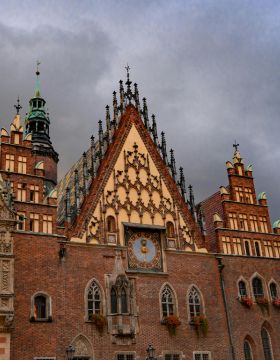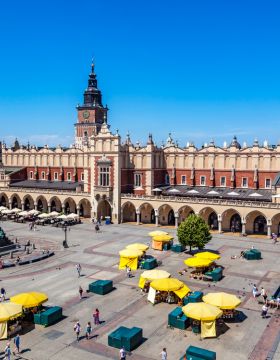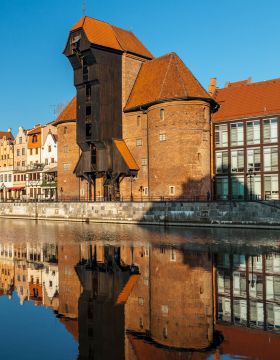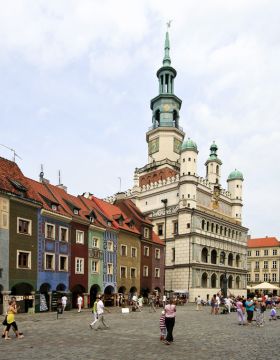Comprehensive Guide on Moving to Poland
Are you thinking of moving to Poland? Rest assured, you are in good company as numerous people all around the world opt to relocate to this stunning country. With its rich history, vibrant culture, and diverse lifestyle, Poland is an attractive destination for people seeking a new place to call home.
Deciding to move to a new country is a significant step in your life. Therefore, it is important to have access to all the necessary information, paperwork, and guidance to simplify the moving process. In this comprehensive guide on emigrating to Poland, we aim to provide you with essential details on different visa options, job search strategies, and the best cities to live in.
Whether you need assistance with Luggage Transportation or cargo collection, the ISS team is here to support you. We hope this guide will address all your inquiries and make your research process stress-free.
Benefits of Relocating to Poland:
- Affordable Cost of Living
- Strong Economy
- Job Opportunities
- High-Quality Education
- Accessible Healthcare System
- Cultural Heritage and History
Get A Free Moving Quote Today
"*" indicates required fields
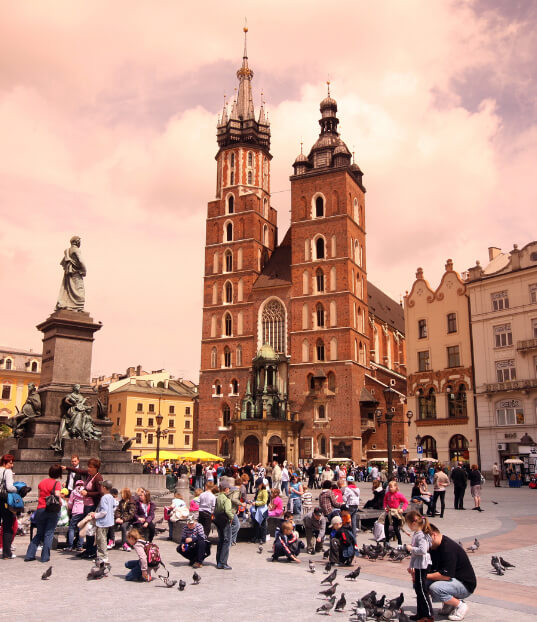
How To Move To Poland
Moving to Poland can be a rewarding experience. Firstly, you’ll need to obtain a visa or a residence permit, depending on the duration and purpose of your stay. Next, you’ll need to find accommodation, either through renting or buying a property. If you’re planning to work in Poland, you’ll need to secure a job and obtain a work permit.
With careful planning and preparation, relocation to Poland can be a seamless transition. Moving to Poland can be a smooth adjustment if it is thoroughly planned and prepared. We at ISS Relocation Service will take care of the logistics needs while you can focus on settling into Poland. Contact our professional team today to learn more.
ISS Relocations offers moving services to and from Poland to:
Dubai, UAE Oman Qatar Bahrain Saudi Arabia Kuwait India

Efficient International Relocation to Poland
Let ISS Relocations simplify your move to Poland. We offer full-service international moving with expert packing, reliable transport, and customs handling you can count on.
Moving To Poland – Visa’s Requirements
There are several types of visas available for individuals planning to relocate to Poland. Here are some common types of visas for Poland along with their requirements.
National Visa (D-Type Visa): This visa is for individuals who intend to stay in Poland for a duration exceeding 90 days. This includes categories such as work visas, study visas, and family reunification visas.
If you have a job offer from a company registered in Poland, then you can apply for a work visa. The employer initiates the process by providing the necessary documents.
Documents Required
- A valid Passport
- Completed visa application forms
- Work permit
- Proof of Qualifications
- Health Insurance
- Proof of Financial means
- Two recent passport-size – photographs
- Visa application fee
The visa is valid for students who have secured admission to a Polish educational institution and intend to pursue studies in Poland.
Documents Required
- A valid Passport
- Completed visa application forms
- Letter of Acceptance from a Polish University
- Proof Of your Qualifications
- Proof of financial means
- Health Insurance
- Two recent passport-size photographs
- Visa application fee
This visa is for individuals who want to join their family members who are already residing in Poland.
Documents Required
- A valid Passport
- Proof of relationship with family
- Proof of Financial means
- Health Insurance
- Accommodation Proof
- Two passport-size photographs
- Completed visa application forms
- Visa application fee
- Determine the type of visa you want to apply for based on your purpose (study, work, or family reunification).
- The second and most important step is to gather all the necessary documents required based on the type of visa you are applying for. You can check the list of documents required for your visa on the website of the Polish embassy.
- Fill out the visa application forms.
- Pay the visa application fee.
- Schedule an appointment at the nearest Polish consulate to provide your fingerprints and photograph.
- Wait for the visa to be processed. It may take up to a few weeks depending on the type of visa and country you live in.
- Once your visa is approved, you can collect it from the embassy in your country.
It is important to note that additional documents may be required for different kinds of visas for Poland.
More Than Movers - We're Your Relocation Partners
Best Cities To Living In Poland
Each city has its uniqueness and charm. Some of the best cities to live in Poland are:
Moving to Warsaw
It is the capital city of Poland, with a thriving business district and a rich history.
Moving to Gdansk
This is a vibrant and lively city with a history steeped in maritime culture, situated on the coast.
Moving to Wroclaw
This is a city with a youthful ambiance, featuring a significant population of students. Wroclaw is renowned for its stunning central market square.
Moving to Krakow
A well-liked place for tourists, recognized for its splendid architecture and vibrant cultural activities.
Moving to Poznan
Poznan is a city with a flourishing art and music culture, renowned for its ancient city center.
Cost Of Moving to Poland
Though the cost of moving to Poland can depend on various factors. We have tried our best to lay out some of the initial costs which can help you gather an insight about the expenses that are to be incurred.
| Type | Cost |
|
Visa Application Fees
|
$40 – $100
|
|
Airfare
|
$500 – $1,500
|
|
Shipping household goods
|
$2,000 – $5,000+
|
|
Rent Deposit
|
$500 – $1,500+
|
|
Utility Deposit
|
$100 – $500
|
|
Mobile phone plan (monthly)
|
$10 – $50
|
|
Health Insurance (monthly)
|
$50 – $100
|
Housing In Poland
In Poland, the real estate market provides diverse housing options, including new and old apartments. Among them, apartments and flats are the most preferred type of housing, especially in cities. Poland has affordable housing, especially when compared to other European nations. Location influences housing costs, with larger cities like Warsaw, Krakow, and Gdansk being more expensive than suburban and rural locations.
The government offers various forms of assistance to support those looking to buy a home, including subsidies for first-time homebuyers and tax breaks for mortgage interest payments. The rental market in Poland is also well-established, with a range of properties available for rent. Rent prices vary depending on the location and the size and quality of the property.
The most common form of housing is apartments are typically found in multi-unit residential buildings. When it comes to getting a house and effectively moving to a new country, ISS ensures to provide the best warehousing Poland services that makes the aspect of relocation comparatively easier. Here is a table highlighting average monthly rental prices for apartments based on the number of rooms and locations in Poland.
| Type of Apartment | Location | Average Monthly Rent (PLN) |
| Studio | City Center | 1,500 – 2,500 |
| Studio | Outside City Center | 1,200 – 2,000 |
| 1 Bedroom | City Center | 2,000 – 3,500 |
| 1 Bedroom | Outside City Center | 1,500 – 2,500 |
| 2 Bedroom | City Center | 3,000 – 5,000 |
| 2 Bedroom | Outside City Center | 2,500 – 3,500 |
| 3 Bedroom | City Center | 4,500 – 7,000 |
| 3 Bedroom | Outside City Center | 3,500 – 5,500 |
HealthCare System In Poland
Poland has a universal healthcare system funded by the contributions of employers and employees. The National Health Fund provides primary and specialist care free of charge or with a small co-payment. Patients can choose their healthcare provider and have access to private healthcare for efficient treatment.
Additionally, there is an expanding private healthcare sector in Poland that provides faster access to medical care and more comprehensive services. Private healthcare providers typically charge higher fees, and patients may have to cover costs for services not covered by public health insurance.
The universal coverage and accessibility of Poland’s healthcare system are available to all residents regardless of wealth or work position. The system is financed by a combination of taxes, employer and employee payments, and other sources. This guarantees that healthcare is inexpensive and readily available to everyone, without placing a burden on society’s vulnerable citizens.
The availability of specialized services and treatments, including cancer therapy, organ transplantation, and rehabilitation, is another benefit of the Polish healthcare system. To guarantee that patients receive the best care possible for their diseases, these services are offered in hospitals and specialized centers.
Taxation In Poland
Poland has a tax system that is based on a progressive structure, meaning that individuals are taxed according to their income level. Tax rates range from 17% to 32%, with the highest rate applied to income that exceeds a specific threshold. With this, employers are also required to contribute to social security and healthcare funds for their employees.
Additionally, value-added tax (VAT) is levied on most goods and services, with a standard rate of 23% and reduced rates of 5% and 8% for specific items such as medical supplies and food items.
PLN 8,000 (about $2,000) is the annual tax-free allowance. Businesses must pay corporate income tax, which is currently fixed at a flat rate of 9%, on their profits. Additionally, companies are permitted to claim deductions on costs like employees, rent, and equipment.
Education System In Poland
Poland has a well-developed education system. It offers free education for all children between the age of 6 and 18 years. Children must complete primary school, which lasts for six years, to receive a foundational education. After that, students may opt to complete three years of lower secondary school and three years of upper secondary education, which are optional but compulsory for those who want to pursue higher education.
At the secondary level of schooling, the schools in Poland offer a choice to students to select between academic and vocational tracks. Universities, technical universities, and high schools of economics offer higher education in Poland. Higher education institutions come in public and private forms, with the public being more prevalent. Poland’s academic year is divided into two semesters and begins in October. There are breaks for the winter and summer holidays.
The institutions and universities offer a variety of courses. Poland’s education system is highly respected worldwide for its quality, and as a result, it is becoming a more popular choice for international students.
Work Market In Poland
Poland’s job market is expanding as there are many opportunities available to fulfill the needs of the general. The need for skilled workers is also increasing, making it an appealing option for those seeking employment opportunities. The transition from a centrally planned to a market-oriented economy in Poland over the past few decades has had a considerable impact on the labor market.
Poland’s economy has grown quickly since it joined the European Union in 2004, which has benefited the labor market and sectors such as IT, Finance, Manufacturing, and Healthcare. To meet the needs of manufacturing and service industries with a trained labor force, Poland has also made significant investments in vocational education. Foreign investment has increased recently, which has resulted in both the expansion of existing jobs and the creation of new ones.
Moving To Poland? Start Your Stress-Free Move Now!

FAQs – Moving to Poland
How to migrate to Poland from the UAE?
Migrating to Poland from the UAE involves applying for the appropriate visa based on your purpose—work, study, family reunification, or business. You’ll need proof of employment, financial stability, or educational enrollment. ISS Relocations can assist you with the visa application process, provide guidance on required documents, and offer relocation services to help you transition smoothly to life in Poland.
Is it easy to migrate to Poland from UAE?
Migrating to Poland from the UAE is feasible but involves meeting certain requirements, such as securing a job, enrolling in a university, or proving your financial ability. While the process can take time and effort, ISS Relocations can help simplify the process by providing expert advice and handling the logistics, paperwork, and settling-in services, ensuring a smooth transition.
Is moving to Poland from UAE worth it?
Poland offers an affordable cost of living, excellent job opportunities, and a rich cultural experience. The country’s growing economy and quality healthcare and education systems make it an attractive destination for expats. Moving to Poland from the UAE could be a great decision if you’re seeking better work-life balance and new opportunities. ISS Relocations can assist you in every step of the relocation process, making your move hassle-free and enjoyable.
What are the requirements to immigrate to Poland?
To immigrate to Poland, you must meet the requirements based on your visa type. This may include having a job offer, enrollment in a university, sufficient financial resources, and valid health insurance. For family reunification, you’ll need proof of family ties. ISS Relocations offers assistance with visa applications, finding accommodation, and navigating the legal and cultural aspects of relocating to Poland.
How do I find a place to live in Poland?
Many real estate agents can help you find a suitable place according to your budget in Poland. You can also consider the option of sharing accommodation with a friend or relative who owns a place while moving to Poland.
What is the cost of living in Poland?
Compared to other European countries, the cost of living in Poland is quite affordable. Housing, food, and transportation are the primary expenses that need to be incurred.
What is the language spoken in Poland?
Polish is the official language of Poland but you will find many people speaking English in cities and many tourist destinations.
Is Poland easy to immigrate from UAE?
Poland is relatively accessible for immigrants, particularly from the EU. Non-EU citizens can apply for work, student, or family visas, and the process is generally straightforward. ISS Relocations can assist you with the immigration process, from choosing the right visa to helping you navigate residency requirements.
Is moving to Poland worth it?
Poland offers a high standard of living at a relatively low cost, making it an attractive option for expats. The country boasts a strong economy, rich culture, and beautiful landscapes. ISS Relocations supports all aspects of your move to Poland, including securing a job, finding housing, and settling into your new life.
